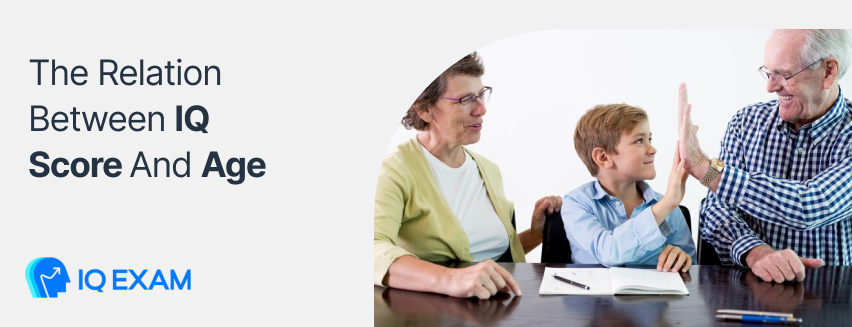
IQ is one of the things that plays a significant role in determining people’s intelligence levels. You may have heard people say that intelligent people have a high IQ.
But what is the IQ of each person at each age? Does the age of people depend on their IQ?
Does it increase with age?
Many of us are familiar with the idea that mental flexibility decreases as we age. But is it the same for IQ? Does IQ increase or decline as we age?
If you are curious about the questions above, this article will give you the correct answers. So read on to discover what happens to your IQ as you age and age.
This article will examine IQ in-depth and whether IQ improves with age. So, keep reading if you are interested in this subject.
What Is IQ, And How To Measure It?
Intelligence Quotient, also known as IQ, is a total score derived from a series of standardized tests used to assess human intelligence. The term IQ was first coined by psychologist William Stern in 1912, based on the German word intelligence quotient.
In fact, each person’s IQ represents the intelligence and skills of people in various fields, such as reasoning, problem-solving, and mental abilities.
It cannot be said that intelligent people have a high IQ or that those with a high score on IQ tests are necessarily smart and have significant abilities in all fields.
But in general, people’s scores and IQ levels show how much their mental ability is to solve some problems.
As mentioned, IQ is the number of points each person gets in IQ tests. Therefore, standard tests are used to measure IQ.
IQ test scores start from 100, and it is different for everyone. The IQ test score is determined according to age group, gender, place of birth, and other factors. Later, we will check the average IQ for different age groups.
Moreover, IQ tests are designed to measure your overall ability to solve problems and understand concepts. These include thinking logically, solving problems, seeing connections between things, and storing and retrieving information.
It is also interesting to know that IQ tests measure general intellectual ability differently, including the following:
Spatial imagination, which is the ability to visualize manipulation of shapes, Math Skills which is the ability to solve problems and apply logic; and Language ability which may include completing sentences or recognizing words when letters are rearranged or deleted. And finally, Memory is the ability to remember visual or auditory presentations.
IQ test evaluates people’s ability in these fields and gives them a score representing their IQ level.
What Is The Average IQ Score For Each Age?
As mentioned, various things affect people’s IQ levels; one of the most important things is people’s age.
In general, everyone has a different IQ according to their age, but research has shown that there is a range for each age group.
In addition, remember that there may be exceptions among these average levels for each age group; for example, a 10-year-old person may have the IQ of a 25-year-old person, or even vice versa.
Next, we check the average IQ levels, and then we check the IQ of each age group:
- 69 and below very low IQ
- 70 to 79: borderline
- 80 to 89: low average
- 90 to 109: Average
- 110 to 119: high average
- 120 to 129: Superior
- 130 and above very superior
The average score for 16-17-year-olds is estimated at 108, meaning “normal or average intelligence.”
The average IQ score for adults who are between the ages of 18 and 19 is determined at 105, which is “normal or average intelligence.”
Moreover, people between the ages of 20 and 24 have an average score of 99, which also means “normal or average intelligence.”
For people between the ages of 24 and 34, the average score is slightly lower at 97, but it still means ‘normal or average intelligence.’
People between the ages of 35 and 44 have an estimated average score of 101, which is still on the “normal or average intelligence” scale.
The Relation Between IQ Score And Age

In the previous section, we explained how much the average IQ of each person is according to their age group. But is there a relationship between people’s age and their IQ?
Would human intelligence increase or decrease with age? For example, if you take an IQ test at 12 and retake it 10 years later at 22, how different will the test result be? Will there be a difference?
Over the years, these questions have also arisen for researchers, so they have done some research on this issue. Older people may have higher performance in intellectual abilities such as reasoning and problem-solving.
Moreover, it can be concluded that although performance IQ increases with age, the research results suggest that overall IQ in adults remains stable.
Besides, age is also relevant as IQ can decline with age. For example, at least one core component of IQ, such as problem-solving abilities, appears to decline with age. However, it can also happen vice versa, which means that some parts of IQ may increase as we age.
In fact, it can be said that if a person has an IQ of 110 at the age of 25, they may have the same IQ score at 50, but their mental abilities, such as problem-solving and analytical thinking, will be performing better.
It should be noted that such a conclusion depends on various physical and mental conditions. Still, the experience and mistakes that a person has in his lifetime can improve his cognitive abilities and help him to make better and more intelligent decisions.
Can IQ Improve With Age?
So far, we have explained IQ and checked the level of intelligence of people in different age groups; we also checked whether there is a relationship between IQ and people’s age or not.
In this section, we want to check if people’s IQs can improve or increase with age. Is it possible that people’s mental ability increases with age? It can be concluded that the IQ of a person who is 55 years old is the same as his IQ at the age of 20.
Different research shows that a person’s IQ score changes with age. Studies suggest that IQ typically increases as adolescents age, meaning that ordinary life and educational experiences alter both the brain and intelligence.
Intelligence is understanding and adapting to the environment using inherited skills and learned knowledge. People’s mental abilities to adjust to a new environment and understand it can improve with age, while the IQ level of people remains the same.
In other words, while intelligence ability changes throughout life, IQ does not. As mentioned in previous parts, the IQ scale averages 100 for each age group. So, for example, the average IQ for a 5-year-old is 100, which is the same for a 50-year-old.
Moreover, intelligence based on IQ, the ability itself, increases from age 20 to 50 but decreases afterward. The maximum score varies from person to person and depends on intelligence.
Besides, although an individual’s IQ can change or improve, it is generally accepted that IQ score remains stable throughout the lifetime.
Note that this does not mean our abilities in different areas do not change as we age.
However, IQ scores remain relatively constant because IQ scores are normalized by age, as we mentioned, the average IQ score for each generation. Still, skills change, but IQ scores tend to be very stable.
Another essential thing to mention is that standard IQ measures also change at different stages of life, especially for kids.
Young children’s IQs change as they grow, which means the IQ score can start at one point and stop growing at another age. Some studies even show that working memory training may improve IQ in elementary school students.
Therefore, it can be concluded that when people are born and begin to understand the environment around them until their IQ level can be measured, their IQ increase. (These cases are provided that people do not have any mental problems from birth.)
Also, with age, people’s mental abilities increase, and they can make better decisions, solve problems, understand the surrounding environment better, etc.
But it cannot be said for sure that the increase in these mental skills means that the IQ of these people has also increased; that is, it cannot be said that if a person’s IQ was 110 at the age of 20 and now at the age of 60, their IQ score in turned to 130!
People’s IQ remains at a specific age, like the teenage period, and does not increase significantly in old age, but their skills improve and increase.
How To Improve IQ Score

Considering what was said in the previous section, and we examined the relationship between age and IQ, in this section, we will discuss the ways that will help you increase your IQ score.
- Try learning business management skills
- Start mediation
- Focus on improving your relationships
- Learn a new instrument.
- Try to start learning a new language
- Learn a new skill, such as painting
- Don’t forget to read more books
- Try to keep yourself educated
- Do puzzle words
- Practice memory activities
- Do exercise and physical activities
- Practice visuospatial reasoning
- Try to focus on doing daily work
The mentioned items are some of the most important and common ways to help you increase your IQ level and mental abilities to perform better in any field.
Conclusion
As mentioned earlier, the IQ of each person in each age group is different, and people’s age-related skills may change and improve with age.
In this article, we tried to answer the questions that may be in your mind about the relationship between IQ and age; we also presented ways to improve your IQ score by following them.
We hope that with the help of this article, we have helped to increase your knowledge about the category of IQ.
